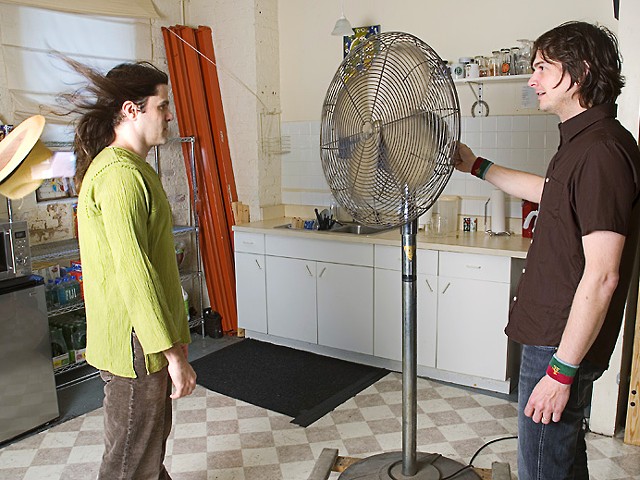Fans of inventive, literate rock & roll shed a little tear when Rats and People called it quits last year. By combining British folk- and indie-rock traditions, the band cut a path between the Dead Milkmen and the Decemberists and left the excellent album The City of Passersby in its wake. But not long after the split, the core of the original band reconstituted itself as the Rats & People Motion Picture Orchestra. The instrumental ensemble writes and performs scores to silent movies of yore by mixing traditional orchestral tools (violin, trumpet and trombone) with modern instrumentation (electric guitar, theremin and Wurlitzer electric piano). The result is an often haunting and always engaging soundtrack that provides a concurrent dialogue to the film's visual storytelling.
To date, the band has scored such silent classics as Buster Keaton's Go West, Sergei Eisenstein's Strike and, most recently, F.W. Murnau's take on the Dracula legend, Nosferatu. The Rats & People Motion Picture Orchestra recently traveled to Vanderbilt University in Nashville to play along with Nosferatu on Halloween night, and the band will reprise its film score at a screening at Off Broadway this week. B-Sides sat down with the band to discuss the difference between rock & roll and orchestral scores, and how best to soundtrack a vampire.
B-Sides: How was the performance of Nosferatu in Nashville?
Brien Seyle (violin, guitar): It was a really engaged audience. When we play these things, the question is, "Who is watching the film?" And these were people with questions about the film. It was people who actually had an experience watching this movie, and that is fucking rad. That's something that we don't always get, though [it happens] more and more.
How does the Motion Picture Orchestra compare to playing in rock bands? This seems like a totally different payoff from playing onstage.
Robert Laptad (drums): After we did Go West and that was received really well, I completely lost the fire to play rock music anymore. I hadn't played rock music that was received that well ever, and we had just done this one thing, and we were getting standing ovations, and over 100 people [were] there. After that, I could never get myself back into playing rock.
BS: We've all been in rock bands and played in lots of rock bands — we played in rock bands for a decade. And guess what? It's always the same — it's always rad — but it's always us getting drunk and playing music. And then we started this thing that didn't have lyrics, didn't have vocals and is just trying to express something that another narrative artist created 80 years ago. It is so much more gratifying to play [this] music. It's just the same as playing rock music: Instead of lyrics, we have a visual story. It's still narrative, and our lyrics were largely narrative all the time. So it's using music to support a narrative.
Matt Frederick (trombone): It seems like the locus has shifted from thinking about how you are projecting yourself to an audience. With a movie-score work, you are thinking much more about the experience of an audience member.
BS: We don't exist. We're inhabiting the film; we're telling people how to feel about the film. We have to have a critical stance on the film, but during the experience of watching the film, we don't exist at all. We're smoke in the chandelier. We're just inhabiting what people are experiencing visually. It's important; it's subtle. It's not about us as humans; it's not about our faces. It's about what we think about the movie after watching it 40,000 times and then writing a critical essay about the film and expressing it emotionally through music and then performing it in such a way where nobody knows we exist.
How did the instrumentation come about for Nosferatu? Theremins and electric pianos aren't normally employed for silent-film scores.
Matt Pace (piano, trumpet): We decided we would use the strings until you finally saw Nosferatu [Count Orlok], and then when he comes in we would use all the instruments with a kind of "wah-wah-wah" sound. So we saved all the weird, vibrate-y electronic noises — sounds that come from the ether — because Nosferatu keeps being described as like a wisp.
BS: And he acts as a shadow, like he's barely there at all.
MP: Also, it's what we had. [Laughs]





